 Viet Nam Human Rights
»
political-social
»
Roles, performance and contributions of women representatives during the 2016-21 period and implications for gender equity in elected bodies in Vietnam
Viet Nam Human Rights
»
political-social
»
Roles, performance and contributions of women representatives during the 2016-21 period and implications for gender equity in elected bodies in Vietnam
Roles, performance and contributions of women representatives during the 2016-21 period and implications for gender equity in elected bodies in Vietnam
30/9/21
Vietnam has made remarkable achievements in ensuring gender equality, empowering women, and promoting women’s participation in political leadership. According to the latest report of World Economic Forum on Gender Gap in 2021, Vietnam scores 0.701 on a scale from 0 to 1 in terms of gender gap index, ranking 87 out of 156 countries. The Communist Party and State of Vietnam have set many goals to promote the participation of women in politics. Resolution 26-NQ/TW in 2018 of the Communist Party of Vietnam (CPV) sets a target that the proportion of women representatives in the National Assembly and People’s Councils at all levels must reach over 35 percent by 2030.
Results of the 2021 Elections of the 15th National Assembly delegates and People’s Council deputies at provincial, district and commune levels for the 2021-26 period were promising (see Table 1). The percentage of women in the 15th National Assembly is now at 30.26 percent - an increase by 3.54 percent from the 14th National Assembly. For the 2021-26 People’s Council offices, women now account for 29 percent at the provincial level, 29.08 percent at the district level, and 28.98 percent at the commune level, with respective rises by 2.46, 1.23 and 2.39 percent from the 2016-21 People’s Council deputies at the three levels.
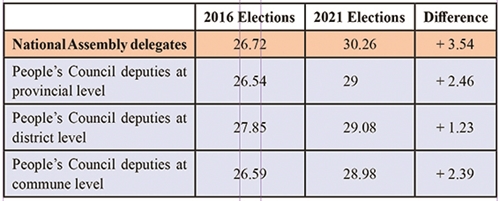 |
| Table 1: Percentages of successful women candidates in 2016 and 2021 Elections |
| Source: https://baucuquochoi.vn/infographics-ket-qua-bau-cu-dai-bieu-hdnd-cac-cap-nhiem-ky- 20212026/1158.vnp and https://baucuquochoi.vn/infographics-co-cau-499-nguoi-trung-cu-dai-bieu-quoc-hoi-khoa-xv/1155.vnp. |
To achieve the established goals by Resolution 26-NQ/TW, a lot more needs to be done to reduce social steoreotypes on women that run for and take elected offices. One of the objectives of the research presented in this article is to understand what female National Assembly delegates and People’s Council deputies did while performing their representative roles in legislation, oversight and making important decisions on national and local affairs. More importantly, findings from the qualitative and quantitative research suggest different sets of implications to advocate for policy and actions that need to be developed and undertaken to realize the political commitment to gender equity in elected bodies in Vietnam. This article presents key findings from and implications from the research with the participation of 245 National Assembly delegates that served the 14th tenure and 136 provincial People’s Council deputies that served the 2016-21 term in Hanoi, Binh Phuoc and Can Tho.[2]
Roles, performance and contributions of elected women representatives
Women representatives’ proactiveness and application of modern means in voter contact
Voter contact is the first important activity reflecting the roles of the female National Assembly delegates and People’s Council deputies. In general, voter-contact activities performed by female delegates are divided into two groups. The first is the general activities organized by the National Assembly Delegations or the Vietnam Fatherland Front Committees (for National Assembly delegates) and the People’s Councils or the Vietnam Fatherland Front Committees (for People’s Council deputies). The second is the activities which are proactively carried out by the female National Assembly delegates and female People’s Council deputies.
Proactive participation in voter contact reflects the active roles of the National Assembly delegates in general and women delegates in particular. On average 50 percent of both the National Assembly delegates and provincial People’s Council deputies surveyed had proactively communicated with voters in 2019. Among the National Assembly respondents, 47 percent of men and 56 percent of women said they had proactively interacted with voters, about 9 percent more from women delegates. Similarly, among the interviewed provincial People’s Council deputies, more women than men delegates said they proactively contacted voters in 2019, with 56 percent of women respondents and 46 percent of men respondents, respectively (see Figure 1).
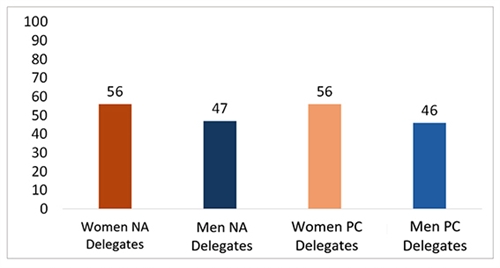 |
| Figure 1: Proactively meeting with voters in 2019 by gender (%, rounded) |
The means for interactions between National Assembly delegates and People’s Council deputies and voters were also studied. In addition to face-to-face meetings, a large proportion (42 percent) of National Assembly delegates contacted and interacted with voters through emails and social media applications such as Zalo and Facebook. This emerging practice not only contributes to diversifying forms of interaction with voters but also improves the effectiveness of voter-contact activities of the National Assembly and People’s Council delegates.
Figure 2 shows that more women than men representatives contacted their voters through electronic devices and applications. Around 51 percent of women National Assembly delegates contacted voters via emails and social media applications, about 14 percent higher than their men counterparts. Among one-third of the interviewed provincial People’s Council deputies said they interacted with voters through emails and social media such as Zalo and Facebook, around 41 percent were women deputies, about 12 percent higher than men deputies. This significant finding partially reflects the dynamism and ability to learn and use social media apps of women deputies in voter-contact activities.
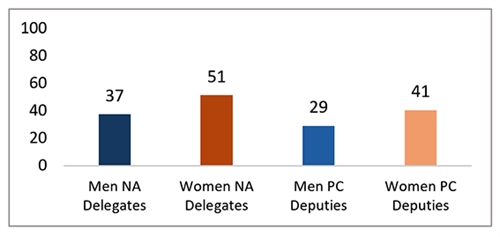 |
| Figure 2: Delegates contacted with voters through social media apps (%, rounded) |
One important mandate of any elected representative is to express their views and report on voters’ feedback at plenary sessions or group meetings, through the mass media, or through research publications. Within the framework of this study, the representatives self-assessed the frequency of speaking on a scale from 1 to 5, with 5 is the most frequent. Findings in Figure 3 show that both men and women representatives had a high frequency of expressing their views and voters’ feedback in different forms. The slight difference is noted in the frequency that women National Assembly delegates and women provincial People’s Council deputies express their and voters’ views, with the former having less than the latter by 0.2 point.
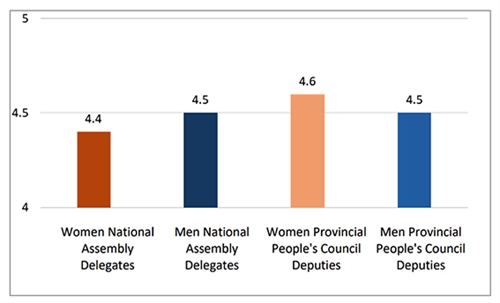 |
| Figure 3: Self-assessment of frequency of expressing views (averaged on a scale of 1 to 5) |
Women representatives’ handling proposals and petitions from voters
The research findings show that women representatives are confident when assessing their implementation of the important activity of receiving and handling petitions and proposals from voters. A question about elected representatives’ activeness in addressing requests for handling petitions and proposals from voters was raised for them to self-assess on a scale from 1 (the least frequent response) to 5 (the most frequent response).
As Figure 4 shows, both men and women representatives self-assessed that they had frequent responses to petitions and proposals from voters during their 2016-21 office term. Some slight differences are seen between women and men representatives responding to the question, with women respondents seemingly being more responsive and answerable to voters than their men counterparts. Having noted that, both women and men representatives did less in answering voters’ proposals and letters or giving voters information about the handling process.
 |
| Figure 4: Response rates in handling proposals and petitions from voters during 2016-21 term |
Women representatives focusing more on social issues
The study explores elected representatives’ primary focus in their action plans as they committed at the beginning of their office term in 2016. As shown in Figure 5, women National Assembly delegates focused more on education and training, and health care. Similarly, women People’s Council deputies focused on education and training; labor, invalids, and social affairs; and home affairs. In addition, findings from the question about the representatives’ opinions of which field(s) male or female delegates perform better show that National Assembly deputies believed that male delegates have ability to do better than their female counterparts in the fields of national defense, security, economics, environment, science and technology. Meanwhile, the fields that female National Assembly delegates think they perform better than their male counterparts are education, health care, labor and employment. These findings show the skewedness in women representatives’ action plans to social matters than other economic and national security issues, leading to an open question about their voice in the latter important policy concerns and a potential need for an interdisciplinary approach to induction for new elected representatives in future terms.
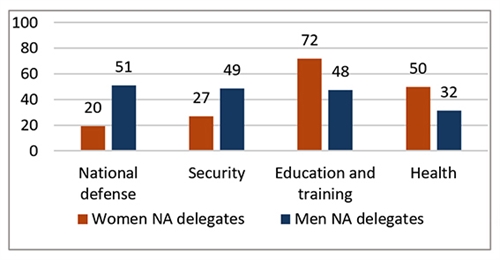 |
| Figure 5: Focused areas in National Assembly delegates’ action plans (percentage of respondents) |
Women representatives’ strengths in performing their duties similar to those of their men counterparts
In terms of strengths of the National Assembly delegates and People’s Council deputies, in the survey, delegates self-assessed their strengths with detailed activities. The self-assessment was based on a scale from 1 to 5, with 1 is the strongest and 5 is the weakest. The survey data shows that both men and women delegates of the National Assembly self-assessed that participating in lawmaking (legislation) is their top strength, while voter contact is the second one and oversight ranked third. Among the interviewed People’s Council deputies, both men and women deputies self-assessed that their top strength was oversight and the second one was voter contact. This reveals that elected representatives in the 2016-21 term did less in oversight and voter contact, which also reflects previous findings about their answerability and direct contact with their constituencies.
High expectation for a rise in the number of women representatives in the National Assembly and People’s Councils
Opinions of elected representatives about the proportions of women delegates of the 14th National Assembly and the People’s Councils in the 2016-21 term were collected to understand how they perceived gender equity in elected bodies. Interestingly, the survey findings (Figure 6) show that, 63 percent of the interviewed National Assembly delegates and 79 percent of People’s Council deputies perceived that the proportions of women in those offices during the 2016-21 term was reasonable.
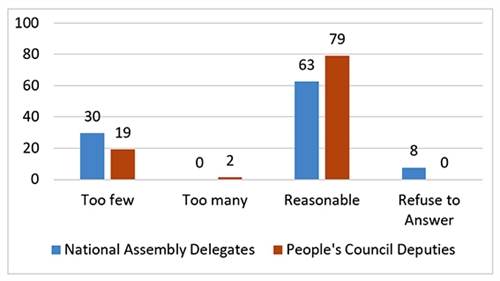 |
| Figure 6: Views of current numbers of women National Assembly delegates and People’s Councils deputies (%, rounded) |
Gender-based results show the significant differences between the opinions of men and women delegates of the National Assembly about the proportion of women representatives of the 14th National Assembly. Only 23 percent among 155 male respondents thought that the proportion was low, while among 78 female respondents, 42 percent shared the same opinion. Interestingly, the proportion of men delegates (70 percent) think that the current rate of women delegates in the National Assembly was reasonable is much higher than that of women delegates (49 percent).
Nonetheless, many showed their expectation that the ratio of women representatives in the National Assembly and People’s Councils would increase in the future. Approximately 60 percent of National Assembly delegates and 66 percent of People’s Council deputies agreed with the statement that “there will come a time when the number of women representatives equals that of men representatives in the National Assembly and People’s Councils.” Gender-based disaggregation results reveal that 33 percent of men delegates and 20 percent of women delegates did not agree with the statement “there will come a time when the number of women delegates equals that of men delegates in the Vietnam National Assembly.” Meanwhile, 69 percent of women delegates and 55 percent of men delegates were in agreement with the statement. Thus, women National Assembly delegates are more confident in a future of gender equality in terms of representatives than their men counterparts. For the People’s Councils, 76 percent of women deputies and 61 percent of men deputies agree with the above statement, showing the women’s higher confidence in a gender-balanced future of the People Councils.
Women representatives aiming to focus on oversight if re-elected for the 2021-26 office term
The last important point this article presents is about elected representatives’ choice of mandates they would spend more time during the 2021-26 term if re-elected. Figure 7 reveals that women deputies of the National Assembly and People’s Councils would spend more time on oversight if re-elected than their men counterparts. Between women and men National Assembly respondents, there is an obvious difference in their priority given to the oversight function, with 32 percent of women delegates choosing to work on oversight, significantly higher than 25 percent of men delegates sharing the same choices. For provincial People’s Council deputies in selected provinces, women deputies would spend more time on oversight and making important decisions on local affairs while men respondents said they would prioritize resolution development if re-elected for the 2021-26 term. This implies the importance of oversight competence for both men and women representatives to strengthen this function.
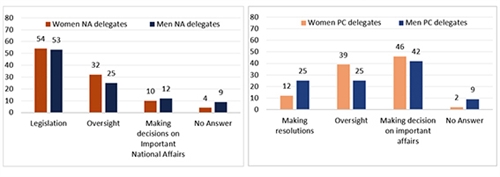 |
| Figure 7: Activities elected representatives choose to focus on if reelected for the 2021-26 terms |
Important implications for ways toward greater gender equity in elected bodies
Key research findings presented in this article, to a large extent, affirm the roles, strengths, focuses and expectations of women National Assembly delegates and People’s Councils deputies when they exercise their constitutional functions of elected representatives. The survey findings provide important implications for policymaking and communication activities when making efforts to reach gender equity in elected bodies in Vietnam.
Policy implications
It is necessary for Vietnam to have detailed policies and roadmaps to achieve the target of having above 35 percent of representatives in the National Assembly and People’s Councils by 2030 being women as stated in Resolution 26-NQ/TW and to fulfill Vietnam’s commitments on gender equity to the international community. To achieve the target, Vietnam should set a quota of at least 45 percent of candidates for the National Assembly and People’s Councils to be of women and the same for men and should have this quota included in the Law on Election of Deputies to the National Assembly and People’s Councils.
Moreover, when establishing candidate structures before every election, it is necessary for election committees to introduce women candidates with relevant but diverse abilities and strengths, equivalent to those of men candidates, to fulfill their constitutional functions as elected representatives. In addition, it is a need to create conditions for capable and qualified women to self-nominate themselves, as a measure to increase women candidates’ success opportunities.
More importantly, policy on candidates coaching and representatives training should include an interdisciplinary approach to development and refinement of action plans so that both men and women representatives can confidently voice their views and provide substantive inputs when developing national legislation or provincial resolutions in a variety of social, economic and security issues. Similarly, the finding about the expectation among interviewed respondents to do more on the oversight role if reelected, especially among women representatives, implies that elected bodies strengthen oversight requirements, approaches and practices.
Communication implications
The study findings demonstrate the roles and strengths of women representatives in the National Assembly and People’s Councils in implementing their constitutional functions of legislation, oversight and voter contact. The findings have a significant communication implication. It is crucial to highlight the roles and strengths of women representatives in the development of Vietnam and their constituencies in addition to emphasizing the participation of women in elected bodies. The study findings about women representatives’ contributions and confidence may provide evidence to gain higher voter trust in women candidates. Elected bodies and agencies involved in election organization should promote communication about the importance of gender equity and craft non-stereotype communication messages before and during any election.-

Popular Posts
-
Religion is a part of the spiritual life in society, this phenomenon of the superstructure has been strongly changed with economic - social...
-
Vietnam has just done well for the second cycle of Universal Periodical Review (UPR) in Geneva, Switzerland. So, what’s the UPR? an...
-
Representatives from foreign countries congratulate Viet Nam on its election to the Human Rights Council for the first time on November ...
-
A street flowers vendor in Hanoi Another new spring has come to Vietnam, bring...
-
Thai people in Shutdown Bangkok protests Not until this crisis, we have realized the ne...
-
If nothing changes, there will be a preferential credit program with hundreds of thousands billion of capital for agriculture and r...
-
Recently, several anti-governmental individuals have established series of illegal groups and organizations in the name of civil soci...
-
Child sexual abuse has been on the increase in Vietnam in recent years according to the Ministry of Labour, Invalids and Social Affairs....
Blog Archive
-
▼
2021
(
522
)
-
▼
tháng 9
(
39
)
- Vietnam puts people at centre of development
- Amnesty –special humanitarian decision of signific...
- HCYU Central Committee supports disavantaged peopl...
- Party hallmarks seen in every success of Vietnames...
- Vietnam condemns use of chemical weapons at UNSC d...
- Vietnam enjoys rising position in international arena
- Viet Nam National Assembly – the convergence of ou...
- Five-year restructuring plan aims to improve natio...
- The Main Contradiction of the Modern Era
- Vietnam continues pursuing aspiration for mighty n...
- EVFTA opens up market opportunities for Vietnamese...
- Vietnam among friendliest countries on Earth
- General Assembly President calls for halt to nucle...
- More than 2.6 million workers in HCM City benefit ...
- Disadvantaged children to get more support
- Vietnamese Government making tremendous efforts to...
- Science, technology application solution to develo...
- Vietnam supports pandemic-hit Vietnamese workers i...
- Vietnam provides support for foreigners amid pandemic
- PM launches programme to provide computers for dis...
- Two of Vietnam's biosphere reserves win UNESCO rec...
- COVID-19 Recovery Requires Justice Beyond Rhetoric
- As War Keeps Poisoning Humanity, Organizing Contin...
- U.S. calculations in North Korean nuclear issue
- Foreign investors affirm confidence in Vietnam's e...
- Gov’t officials congratulate Cao Dai followers on ...
- Efforts made to bring special Mid-Autumn Festival ...
- Vietnam always pay attention to gender equality is...
- Vietnamese Ambassador is ready for new global chal...
- Viet Nam enjoys trade surplus with CPTPP markets
- Việt Nam proposes establishment of comprehensive d...
- Việt Nam refutes “unobjective” claim about Interne...
- 2-mln-USD project to prevent maternal deaths in Vi...
- 30 trillion VND from unemployment insurance fund t...
- UNICEF speaks highly of Vietnam’s priority to COVI...
- Great national solidarity spirit continues to shine
- Afghanistan – Another Viet Nam?
- Several strategic directions of the Party for the ...
- Roles, performance and contributions of women repr...
-
▼
tháng 9
(
39
)









All comments [ 20 ]
We can confirm the important roles and significant contributions of female deputies to the National Assembly and People’s Councils during the 2016-2021 term, and called on voters to select competent and qualified candidates, regardless of their gender.
It provides empirical evidence of how female deputies of the NA and provincial People’s Councils have contributed to the socio-economical and political development of the country over the past five years.
The NA had its first female chairperson and female delegates accounted for 26.8 percent.
Their areas of focuses and strengths are different, both male and female elected representatives noted that the interest of voters in their constituencies is the most important factor influencing their views of a specific issue.
Women deputies more frequently engage with voters via social networking applications than men representatives.
They were confident that they had promptly responded to voters’ proposals and petitions.
Their top strength was in performing the legislative mandate.
In the meantime, interviewed provincial People’s Council deputies, men and women alike, considered that oversight performance is the top strength.
In terms of values, both surveyed men and women representatives from the National Assembly and provincial People’s Councils valued the merits of ‘listening’, ‘having personal viewpoints’ and ‘having the ability to persuade others’.
Women representatives tend to value the merit of ‘having the ability to persuade others’ than their men counterparts.
Women’s leadership in public sector is an important issue as it is essential to have women’s perspectives and voices involved in the decision-making process.
There must be women representatives in the Standing Committee of the Party at provincial level and Party committees at all levels: the proportion of women representatives at all levels should be between 20 and 25 percent.
The rates of women representatives in the National Assembly and People’s Councils should be over 35percent
it suggests that elected women and men deputies participate in all fields by introducing gender quotes for all NA and all People’s Councils committees
Gender equality is considered one of the national development goals in Vietnam.
In the past 10 years, proportion of women in positions of leadership and decision-making has been increasing notably in elected bodies.
Appareling an increase in number, quality of women cadres has been steadily improving.
No matter what positions they hold, women demonstrate their reputation of high responsibility, honesty, straightforwardness, modesty, democratic management style, persuasive manner, dedicative working style, transparency.
The Women Unions at local levels have played active role in nominating women to election of the Party Committees, National Assembly, and People’s Councils at all levels and advocating constituencies’ vote for women’s nominees.
Gender sensitization should be a basic knowledge to be transferred to leaders and people (women and men) to change their discriminative behaviors to women especially to women authorities with respect of their political participation.
Your comments